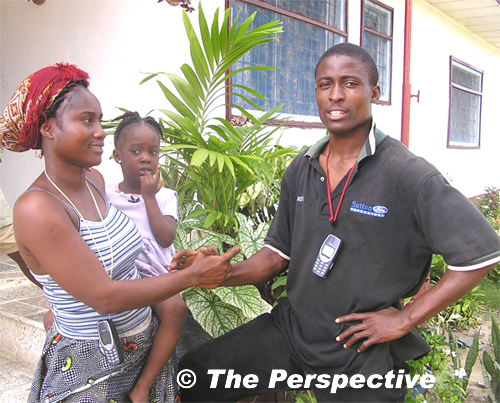
The Liberian Government Restricts GSM Mobile Companies to Four
By Josephus Moses Gray
jmoses1970@theperspective.org
Monrovia, Liberia
The Perspective
Atlanta, Georgia
December 2, 2004
The decision, which was contained in a statement issued recently by the Ministry of Post and Telecommunication, revealed that eight mobile companies have been granted licenses but only four will be permitted to operate in the country.
 |
| It seems like everybody sports a cellphone in Monrovia - even cellphones that have been disconnected due to subscribers' inability to buy scratchcards. |
The services provided by the selected GSM mobile companies are very poor - poor reception - and callers usually find it difficult to get their calls through. On some occasions, it is very difficult for callers to understand each other on the line.
According to the government, the transitional frequency allocations are as follows: Lone Star, 907 – 915 Mhz; Cellcom, 895-902 Mhz; Libercell, 890-895 Mhz and Conmium, 902-902 Mhz, respectively. The Minister has admitted to inefficient spectrum management, scramble for excessive bandwidth and growing poor quality of service to the public.
Meanwhile, the government says it shall negotiate
equitable compensation packages with other firms that
were given licenses but not allowed to provide GSM
and telecommunications services. The Ministry, however,
failed to identify the other four companies denied
permission to operate. It is not clear as to whether
the government has the wherewithal to compensate the
companies.
The government first imposed a moratorium for the
registered companies to delay their operations. But
those companies that ignored the government order
and proceeded with their activities are the companies
that are today allowed to operate, while those companies
that honored the order become the losers.
Not too long ago, The Perspective carried
an article about a cell
phone company that had registered to do business
in Liberia. According to the article, the company
known as LIWICO was granted license by the Liberian
government. LIWICO is said to be 100% Liberian-owned.
Obviously, it is one of the companies affected by
the government’s decision.
More importantly, the government’s decision
does not augur well with some Liberian technocrats
and entrepreneurs in the Diaspora who say that while
government officials publicly state that they want
Liberians to return home to help with the reconstruction
process, they always erect roadblocks whenever Liberians
decide to answer the call.
But several persons who spoke with The Perspective
in Monrovia over the latest decision alleged that
companies that were given permits to operate are the
ones that may have given “kickbacks, and brown
envelopes”; a practice of giving bribes before
a company or an individual is given permit to operate
a business or appointed to a position in the Liberian
society, regardless of his/her qualification.
In this case, one may ask, what criteria did the NTGL
apply to have arrived at the four GSM Mobile phone
companies it selected, while excluding the other four
including the one owned by Liberians from abroad who
are not only willing, but prepared to contribute to
the economy and development of their country? What
message is the NTGL sending to Liberians abroad that
want to invest in the country?
Due to the outright refusal to level the playing field
for Liberians abroad, it suggests that the NTGL is
encouraging de facto monopoly in the country. With
this kind of attitude, there will always exist fraud,
rampant corruption and the provision of poor telephone
services to our people.
